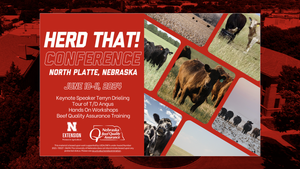MCOOL discussion heats up again
Congressmen and beef industry leaders weigh in on reinstating Mandatory Country of Origin Labeling.
September 20, 2021

It’s been close to seven years since MCOOL was repealed, and you’ve likely heard that Mandatory Country of Origin Labeling (MCOOL) is back on the table once again.
MCOOL has a long history of being highly polarizing in the beef cattle industry, but with a new administration and an interesting mix of Congressmen bringing it back to the forefront, it certainly is drawing a new set of eyes and interest on the labeling rule.
Earlier this month, Senators John Thune (R-SD), Mike Rounds (R-SD), Cory Booker (D-NJ), and Jon Tester (D-MT) introduced a bipartisan legislation that would clarify how beef is labeled in the United States.
The “American Beef Labeling Act” would reinstate MCOOL for beef and would require the U.S. Trade Representative (USTR) in consultation with the U.S. Secretary of Agriculture to develop a means of reinstating MCOOL that would be compliant with the World Trade Organization (WTO) within one year. If USTR fails, MCOOL with automatically be reinstated.
Senators explain the American Beef Labeling Act
Of the American Beef Labeling Act, Senator Tester said, “Montana ranchers raise the best cattle in the world, and it’s time American families are guaranteed the right to know whether their beef is from Broadus or Brazil. With the announcement this week that there is another Mad Cow Disease outbreak in foreign meat, it’s more important than ever that consumers know when they’re buying American beef at the supermarket. This bipartisan legislation will level the playing field for Montana’s family farmers and ranchers and protect the health and safety of American families.”
Senator Thune said, “Transparency in labeling benefits both producers and consumers. Unfortunately, the current beef labeling system in this country allows imported beef that is neither born nor raised in the United States, but simply finished here, to be labeled as a product of the USA. This process is unfair to cattle producers and misleading for consumers. When you see a ‘product of the USA’ label on the grocery store shelf, it should mean just that.
“South Dakota cattle producers work tirelessly to produce some of the highest quality beef in the world. The pandemic has only highlighted their important role in our domestic food supply and the urgent need to strengthen it. To ensure the viability of cattle ranching in this country, the system in which producers operate must be fair and transparent. As a long-time supporter of MCOOL, I am proud to introduce this legislation, which will move us one step closer to making that a reality.”
Senator Rounds said, “It’s time to restore Mandatory Country of Origin Labeling (MCOOL) once and for all. This is an important step in restoring market integrity for consumers and cattle producers. For too long, the packers have skewed this market in their favor. Now, we take it back. I’m thankful to my colleagues for helping carry this important issue for consumers and cattle producers. I’ve long said that consumers will need to drive and help carry this policy debate. For those of us who support MCOOL for beef, this is just the start. The nine major cattle producing states won’t get this done alone. We need a national campaign to see this over the finish line.”
And Senator Booker, who is an outspoken vegetarian and an interesting ally in this discussion, said, “Americans should know exactly where their beef is coming from, but current USDA labeling practices allow big meatpacking companies to falsely label imported beef as being a product of the USA. I’m proud to join colleagues in this bipartisan legislation that will restore mandatory country of origin labelling for all beef products and provide fairness for our family farmers and ranchers.”
The beef industry weighs in
R-CALF USA CEO Bill Bullard said, "This Thune/Tester/Rounds/Booker MCOOL bill is critically needed to restore competition to the nation’s broken cattle and beef markets marked by inflated beef prices paid by consumers and depressed cattle prices paid to U.S. cattle producers.
“Only with MCOOL for beef can cattle producers compete in their own domestic market where packers and importers – and not cattle producers and consumers – currently decide how much foreign beef they will import into the U.S. market to displace domestic beef production and reduce demand for cattle exclusively born and raised in the United States.
“We are profoundly appreciative of Senators Thune, Tester, Rounds, and Booker for taking the lead in representing the interests of their respective cattle producing and beef consuming constituents by introducing this critically important MCOOL bill.”
Meanwhile, National Cattlemen’s Beef Association Vice President of Government Affairs, Ethan Lane, told RFD-TV, “It was not successful in generating additional revenues for producers. It actually works against allowing producers to differentiate their products in the marketplace. We're doing so much work to expand regional processing capacity and provide additional opportunities for producers to regain some of that leverage in the negotiation with packers. This really disincentives that. Not to mention, we know that this is not a trade compliance solution.
“The legislation as written, simply says, USTR needs to make it trade compliant but it offers no solutions to accomplish that. And in fact, it goes even further and says that if they fail at that task, the law will just go into effect anyway. So, they're effectively saying they're okay with a billion dollars and retaliatory tariffs being leveraged, levied against the U.S. cattle and beef industry, and we're simply not okay with that.
"We want to achieve more product differentiation for U.S. Beef-- it's a superior product! And the way to do that is through creating source verified labels that allow producers to find a marketing strategy and a true marketing label that works best for what they're producing that allows them to reach consumers in a unique way that commands more value.”
And Justin Tupper, United States Cattlemen’s Association vice president, told KRTV Great Falls, “It goes back to common sense and consumers want to know where their product comes from. We know that they're willing to pay for a product that they know is safe and came from the United States and hardworking ranchers. And we have a bill now that would take us back to that. What effect it will have on the cattle market is something we don't know yet, but I have to believe it will be a positive.
“The spotlight has been on us and the industry to try to get something done. A tip of the cap to Thune and Tester for having the courage to push forward this mandatory country of origin labeling bill.”
What’s your take on MCOOL? Sound off in the comments section below.
The opinions of Amanda Radke are not necessarily those of beefmagazine.com or Farm Progress.
About the Author(s)
You May Also Like




.png?width=300&auto=webp&quality=80&disable=upscale)
